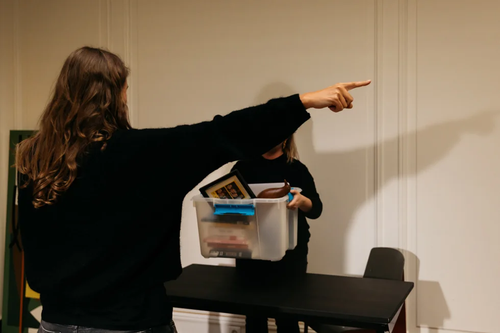8 weird interview questions and how to answer them
Mar 17, 2022 - updated Aug 17, 2023
10 mins


Freelance journalist and writer
What would you do if you could travel back in time? In an ideal world, what would you be doing? What bores you the most? What is your favorite thing to have for breakfast?’
Where would you expect to hear questions like these? During a deep conversation with your best friend? Or maybe you remember them from a sleepover you had when you were a child? Well, not exactly. The answer is: in a job interview.
Weird interview questions
The world of recruitment revolves around people. It involves understanding their character, needs, desires, personal and professional lives. So even though you might think these questions have no place being asked, they can be useful for recruiters. So be ready to be asked about anything and everything.
Different roles require different sets of questions and not all interviews will push you to think outside of the box. If you’re applying for roles that involve soft skills, flexibility and creativity, however, the interview will most likely include some quirky questions.
So how should you handle them? What do you do when you are asked about your worst quality, your biggest regret, or your favorite food? We asked Michael*, a professional recruiter with more than five years’ experience, who interviews candidates daily, to help us to decode some of the strangest questions. If you want to know how to prepare for an unconventional interview and what recruiters are looking for in your answers, keep reading.
Using the STAR method to answer
Before we dive into specific questions, it’s important to highlight the best way to answer any interview question: using the STAR method. “If you want your answers to be thorough and clear, make sure to use the STAR method,” Michael says.
STAR stands for:
- Situation - Indicate a particular instance related to the question asked.
- Task - Explain your responsibilities, how you were involved in this situation.
- Action - Describe your personal initiative, how you acted in this situation.
- Result - Demonstrate the results of your actions, the impact you created.
“Remember that you should approach [this] carefully and strategically, whatever the phase of recruitment. For more unconventional and creative questions, the answer itself isn’t the key—it’s the way you think about it and how you choose to elaborate on it [that matters],” says Michael.
The interviewers aren’t just looking for your answers. They want to see how you handle abstract conversations and how you behave when you have to think on your feet. “The STAR method will really allow you to present your individual way of thinking, highlight your personal approach to situations, and imply your willingness to solve problems and take the initiative,” says Michael.
Examples of weird interview questions and what they mean
It’s all well and good to think about funny, odd questions you may be asked in an interview. However, believe it or not, there is a method to this madness. Behind most of these questions lies a strategy, a double meaning (well, most of the time), that candidates should be aware of. Let’s take a look at some of them.
1. Which animal do you identify with?
This question has become an interview staple for some roles. When Kate was asked this question during an interview for a job as a HR manager, she was taken aback. “I didn’t really know what to say and how deep into the answer I should go,” says Kate.
This question is not meant to be taken literally and can be difficult to answer. “The animal question is purely based on metaphors—and metaphors are a very important part of recruitment,” Michael says. Animals are there to represent different types of human behavior, personality, and thinking. So treat this one as symbolic.
“Recruiters can pose the animal question to have a vision of how the candidate thinks about themselves and about their surroundings.” Are you success-driven? Are you outgoing? Or maybe you are more analytical? “Try to pick an animal that best symbolizes your key personality traits and the aspects you would most like to share with the recruiter,” says Michael.
2. What would your ideal job be in a utopia?
With job interviews becoming more demanding, some questions delve even deeper. During an interview for a role as a sales manager, Faizah was asked: What would your ideal job be in a utopia? “It was a nice question to be asked if I have to be honest! I just didn’t really expect it so I wasn’t sure what to say,” she says. “I thought to myself: Do I really go all out with my answer? Or should I play it safe and describe something in the field of finance and sales, something they want to hear?”
Although that question might seem like an invitation to discuss all of your dreams and desires, it’s best not to get carried away. “Don’t be afraid to talk about your professional goals and dreams,” says Michael. What would make you the happiest and most fulfilled as an employee? Think about the style of management you like most and what responsibilities you would like to have.
It is important for recruiters to understand not only what type of professional you are but also your long-term goals and aspirations—and this question allows for exactly that. “Maybe you applied for this position because it looked interesting. Yet this is not the path you really want to take… you just want to try it out,” says Michael. “If you are completely honest, they might realize that you don’t see a future with the company and not offer you the role.” So you need to consider what effect your answers will have.
Don’t fall into the trap of saying that the role you are applying for is the one you would choose in an ideal world. “Even if it is, we’d rather you show us you can think outside the box and dream bigger. Give us that personal angle of what could make you even happier, should you be offered the role you are applying for,” he says. From the recruiter’s perspective, understanding the candidate’s professional expectations, and finding someone who can fulfill every aspect of the role and prove to be a sustainable investment, is crucial.
3. What is the most boring thing you have ever had to do?
William, who is a partner and manager in a professional services consultancy, says that he has heard some odd questions in his time. “I took part in many job interviews and I have to admit that I heard quite a few strange questions,” he says. During one interview for a role as a recruiter, he was asked: What is the most boring thing you have ever had to do? “I mean, what do you say in this situation? How do you react? I was pretty taken aback when I heard it,” William says.
You might wonder why an interviewer would want to know that. Wouldn’t the answer be boring for them too? But, we all get bored sometimes. It’s natural. We can’t be engaged and passionate all of the time—and there’s nothing wrong with that. In fact, what makes you bored can also be a good indicator of some hidden aspects to your character.
To get a good understanding of your personality, recruiters need to also get to know your vulnerable side, not just your strengths and passions. “No candidate is perfect and recruiters know that. In this instance, a question about something that made you bored will give the recruiter a good insight into how you approach challenges and hardships, whether professional or personal,” Michael says. Things that bore us tend to lower our motivation. What you need to show to a recruiter is exactly how you overcame this temporary lack of motivation.
This is a good time to use the STAR method. “Describe a specific situation when you felt bored, what caused this feeling, and what you did to get out of the funk. Be honest—whether it was a boring task at work or something that happened outside of it. Your goal here is to show how, in the end, you approached this situation proactively and turned it around, instead of letting the feeling of boredom and lack of motivation linger.”
If you want to go one step further, try applying the STARR method, where the last R stands for “reflection.” “Think about what you learned from this experience. Is there anything you would change next time? Would you have acted differently to achieve a more positive result?” Michael says. “Applying the second R to a question can show recruiters your ability to reflect and take the initiative.”
4. What do you least like about yourself?
This is another tough question William was asked during the same interview. “This one goes even deeper. I never try to think about my bad side, let alone talk about it in a professional setting,” he says. But the question makes sense. Sharing your weaknesses with a recruiter, as daunting as it may seem, can be a chance to show them you are not afraid to embrace what you still need to work on—and that you can be open not only about what’s positive and successful.
“You may be scared of this question but the best advice I can give here is - answer it honestly and sincerely,” says Michael. We all have some things we need to work on, things that do not sit well with us. Maybe you find it difficult to say “no” at work. Maybe you’re too much of a perfectionist. Or you tend to get overwhelmed and disorganized when you have too much on your plate.
“What you want to show in your answer is how you can turn some of your weaknesses into your strengths. Similarly, you can also take this as an opportunity to follow up with your strengths and how you’re using them to work on your weaknesses,” Michael says. You can explain that you are working on being more assertive, getting out of your comfort zone, and asking others for an opinion on your work, or trying out a new personal organization method to keep on top of your work. “Everyone has faults—use yours to emphasize your motivation to keep growing, both as a professional and an individual.”
5. If you could go back and change a single moment of your life, that wouldn’t change your financial situation, which would it be?
William says, “Once, during a job interview for a consulting firm, I was asked, ‘If you could go back and change a single moment of your life, that wouldn’t change your financial situation, which would it be?’. This question was not as personal as the other ones but I really had to think hard and strategically about what answer to give. In the end, I said I would go back to my school years and work harder towards my final exams.”
This question is not unlike the previous one, according to Michael. “Although it doesn’t look like it, this question has a very similar purpose to the one we just discussed,” explains Michael. To respond, you will need to think about situations where you did not succeed, encountered difficulty or a challenge. Then you should show the recruiter that you understand what went wrong and have learned your lesson. “The focus here is on a situation that would not impact your financial situation. Talk about moments that have impacted you personally, that built your character. It can be as simple as choosing a different school or doing a different degree, and concentrating on what you truly wanted to do from the beginning,” says Michael.
Learning from our mistakes and acknowledging that there are things in life that we could have done differently, is difficult. Yet it is key to understanding the complexity of one’s character. Michael says, “Facing difficult decisions, talking about them, explaining your choices, are all significant to our personal development. Such insight into your more vulnerable side will help recruiters understand your character and see whether it matches the role.”
6. If you had to fire one of your fellow candidates, who would it be?
Faizah recalls that during a group interview for a job in finance all of the interviewees were asked: If you had to fire one of your fellow candidates, who would it be? She says, “I felt horrible even thinking about having to fire one of the people I had just met, and then explain my choice. The question made me feel uncomfortable.”
This was a strange request. So what was the recruiter trying to achieve? “In this instance, all the recruiter wants to do is to put you in a difficult, uncomfortable position—and to see how you get out of it,” Michael says. “It’s not only about who you choose to fire and how you deliver this information but also about whether you are able to provide sufficient and constructive feedback.” Why did you choose that person? Which aspects of their personality or their performance made you pick them? What can they do to improve and to fit the role in the future? These are the points you should cover when asked a question like this.
Think of this also as an opportunity for you to demonstrate just how well you understand the role. “You need to give a clear understanding of the position itself and its requirements to be able to fire someone from it. Really justify your choice by making relevant connections to what you already know about the role,” says Michael.
7. What is your favorite spread to put on bread?
Some questions defy categorization, such as the one asked of Thais, who had applied for a position as a HR assistant. The interview was going really well and she had a good feeling about it. Right at the end, however, she was asked: What is your favorite spread to put on bread?. Thais was confused—why would a recruiter want to know this?
The explanation is simple: questions like these are asked to see how you respond. The answer is really important. “Questions like these are usually asked of people applying for jobs that are considered to be social, people-driven, and that involve networking—where one has to be flexible and adapt to different social environments,” Michael says.
8. Do you prefer to eat your cheesecake with or without raisins?
A similar question is “Do you prefer to eat your cheesecake with or without raisins?”. Such questions don’t really have a grand purpose. “They’re usually asked to make the candidate loosen up a bit and simply remind them that both the candidate and the interviewer are only human.”
Trust yourself to answer
These strange, abstract questions shouldn’t be feared. They are not intended to confuse you or make you doubt yourself. They are there for the recruiter to find out what kind of person you are and how you think.
So don’t try to prepare every single possible answer in advance. Don’t try to look for the answer you think the recruiter will want to hear either. And don’t panic if you don’t know what to say. “It’s better to say the first answer that comes to your mind, even if you don’t feel confident in it, rather than saying ‘I don’t know’ or staying silent,” Michael says.
“All you need to keep in mind is that the key to a successful interview is to be yourself. Opt for good communication, be open and clear with your answers so that the interviewer does not have to ask you for clarification. Be the leader of your part of the interview and show who you really are, as a worker and as a person.”
That way, it won’t matter what questions are thrown at you. You will be able to handle them.
*Name changed for non-disclosure reasons
Photo: Welcome to the Jungle
Follow Welcome to the Jungle on Facebook on LinkedIn and on Instagram and subscribe to our newsletter to get our latest articles every day!

More inspiration: Navigating challenging interview questions
Prepare for your next interview with our extensive guide on how to navigate challenging questions, protect your rights, and present yourself confidently, even in the face of unexpected inquiries.

Be ready for anything: How to handle unexpected interview questions
No one likes being caught off guard, but there are ways to avoid long silences and drawing blanks.
Mar 08, 2023

Easing the exit: A guide to articulating your career change in an interview
While you may be tempted to rant about a toxic workplace, letting a recruiter know why you're leaving your current role should be handled with care.
Feb 13, 2023

Protect your rights: Navigating illegal job interview questions
Whether intended or not, there could come a time when you find yourself faced with an illegal question in an interview. Here's what to look out for.
Jan 31, 2023

Should you talk about burnout in a job interview?
Talking about mental health in a job interview can be tricky. We look at if and how you should go about discussing burnout with an interviewer.
Oct 10, 2022

The layoff taboo: How to talk about it in an interview
Whether you were let go as part of a mass layoff or your performance just wasn't up to scratch, you'll probably have to talk about it at some point.
Sep 28, 2022
The newsletter that does the job
Want to keep up with the latest articles? Twice a week you can receive stories, jobs, and tips in your inbox.

Looking for your next job?
Over 200,000 people have found a job with Welcome to the Jungle.
Explore jobs